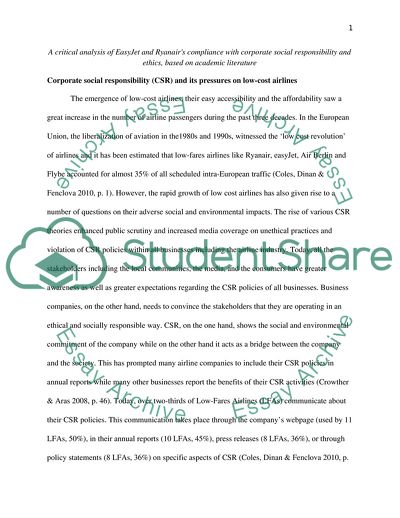Cite this document
(Easyjet And Ryanair's Compliance with Corporate Social Responsibility Case Study Example | Topics and Well Written Essays - 2500 words, n.d.)
Easyjet And Ryanair's Compliance with Corporate Social Responsibility Case Study Example | Topics and Well Written Essays - 2500 words. https://studentshare.org/social-science/1853886-a-critical-analysis-of-easyjet-and-ryanairs-compliance-with-corporate-social-responsibility-and-ethics-based-on-academic-literature
Easyjet And Ryanair's Compliance with Corporate Social Responsibility Case Study Example | Topics and Well Written Essays - 2500 words. https://studentshare.org/social-science/1853886-a-critical-analysis-of-easyjet-and-ryanairs-compliance-with-corporate-social-responsibility-and-ethics-based-on-academic-literature
(Easyjet And Ryanair'S Compliance With Corporate Social Responsibility Case Study Example | Topics and Well Written Essays - 2500 Words)
Easyjet And Ryanair'S Compliance With Corporate Social Responsibility Case Study Example | Topics and Well Written Essays - 2500 Words. https://studentshare.org/social-science/1853886-a-critical-analysis-of-easyjet-and-ryanairs-compliance-with-corporate-social-responsibility-and-ethics-based-on-academic-literature.
Easyjet And Ryanair'S Compliance With Corporate Social Responsibility Case Study Example | Topics and Well Written Essays - 2500 Words. https://studentshare.org/social-science/1853886-a-critical-analysis-of-easyjet-and-ryanairs-compliance-with-corporate-social-responsibility-and-ethics-based-on-academic-literature.
“Easyjet And Ryanair'S Compliance With Corporate Social Responsibility Case Study Example | Topics and Well Written Essays - 2500 Words”. https://studentshare.org/social-science/1853886-a-critical-analysis-of-easyjet-and-ryanairs-compliance-with-corporate-social-responsibility-and-ethics-based-on-academic-literature.


